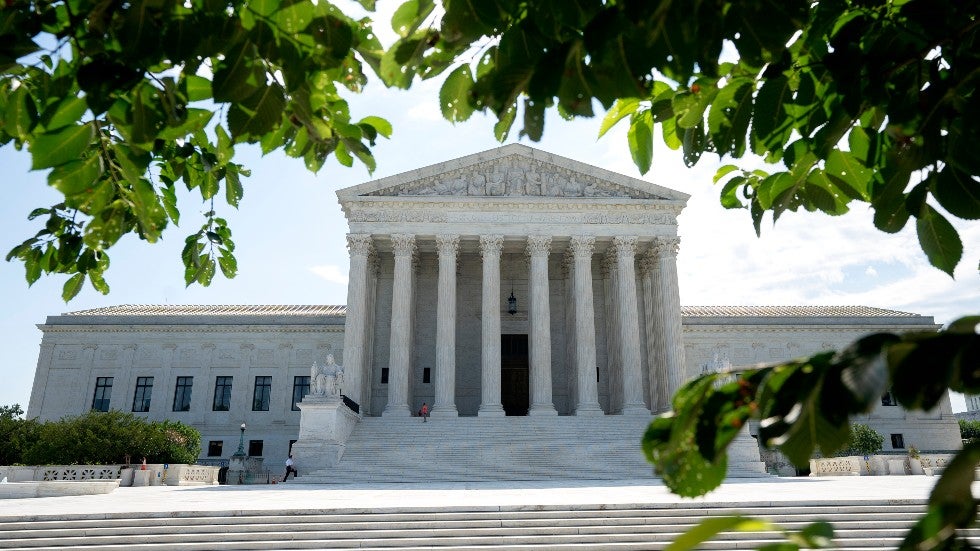By: The Editorial Board – wsj.com – May 14, 2025
Does the 14th Amendment cover illegal aliens, and are national injunctions abused?
On the first day of his second term, Mr. Trump signed an executive order to reinterpret the 14th Amendment. He wants to exclude from “birthright citizenship” babies born in the U.S. to parents here illegally or temporarily, including on student or tourist visas. Three judges in Maryland, Massachusetts and Washington issued “universal” injunctions to block that policy nationwide.
The Justice Department filed an emergency appeal to the High Court, seeking what it framed as “modest” relief. Complaining about the universal injunctions, it asked the Justices to whittle down the lower court rulings so they protect only the specific parties in the lawsuits. The Justices took the unusual step of setting emergency oral argument and could soon rule on citizenship, injunctions, or both.
***
The first question is straightforward. The 14th Amendment was ratified after the Civil War and the wretched decision in Dred Scott (1857), which said black former slaves and their descendants were excluded from U.S. citizenship. The amendment begins: “All persons born or naturalized in the United States, and subject to the jurisdiction thereof, are citizens of the United States.” The dispute is whether illegal aliens are subject to U.S. jurisdiction.
The longtime interpretation suggests yes. In Wong Kim Ark (1898) the Supreme Court held that a man born in San Francisco to alien parents was a citizen. The majority held that the 14th Amendment affirmed “the ancient and fundamental rule of citizenship by birth within the territory,” including for “all children here born of resident aliens.” Exceptions included children born to foreign diplomats or to enemies in “a hostile occupation.”
This fits a plain reading of the amendment’s text. Foreign diplomats have legal immunity, a small example being their refusal to pay New York parking tickets. If some belligerent army were to seize part of the U.S., its troops obviously wouldn’t be “subject to the jurisdiction thereof.” Illegal immigrants, by contrast, are both subject to federal law and routinely prosecuted and imprisoned for violating it.
Proponents of Mr. Trump’s theory argue that Wong Kim Ark’s parents weren’t living in the country illegally, meaning birthright citizenship for the children of transient border-crossers is an open question. Yet it takes hard work to read into the meaning of the 14th Amendment a distinction that seems not to be written there.
Mr. Trump has a better argument when he says federal judges are too quick to issue nationwide rulings. The Constitution empowers the judiciary to decide “cases” and “controversies,” which generally means relief for the parties at hand. As disputes percolate through the appeals courts, the judicial circuits might diverge. When a legal split gets serious, the High Court accepts a case to put things back on the level. That’s the theory, anyway.
What happens in practice, at least lately, is that the political faction out of power challenges the government’s every move in a friendly legal venue. “District courts issued 14 universal injunctions against the federal government through the first three years of President Biden’s term,” the Justice Department says in its emergency filing. “By contrast, courts issued 15 universal injunctions (or temporary restraining orders) against the current Administration in February 2025 alone.”
This rise in sweeping judicial orders hasn’t come out of nowhere. It’s happening in tandem with broad new assertions of executive power. Consider the halting of President Obama’s “deferred action” for illegal parents of citizen children. “We had 26 state plaintiffs,” former Texas Solicitor General Scott Keller said in 2019, defending that injunction. “The very nature of our challenge was that the federal government could not say that certain individuals were lawfully present in the country.”
President Biden’s effort to forgive $430 billion of student debt was frozen in a case involving Missouri’s loan servicer, Mohela. The Eighth Circuit considered a narrower injunction but saw “no workable path” to disentangle who’d be covered. If Mr. Biden had the leeway, he might have quickly wiped out everybody else’s debt, maybe while buying time by telling his Justice Department to dawdle in appealing his Eighth Circuit loss.
The worry about completely ruling out universal injunctions is whether that would enable abuses of executive power. There is plenty for the Justices to chew on here. But as a first bite, they at least could tell lower-court judges to think harder about the relief any given case demands, while reserving extraordinary injunctions for extraordinary situations.
To see this article in its entirety and to subscribe to others like it, please choose to read more.
Source: Birthright Citizenship Reaches the Supreme Court – WSJ
 Listen Online
Listen Online Watch Online
Watch Online Find a Station in Your Area
Find a Station in Your Area









 Listen Now
Listen Now Watch Online
Watch Online
